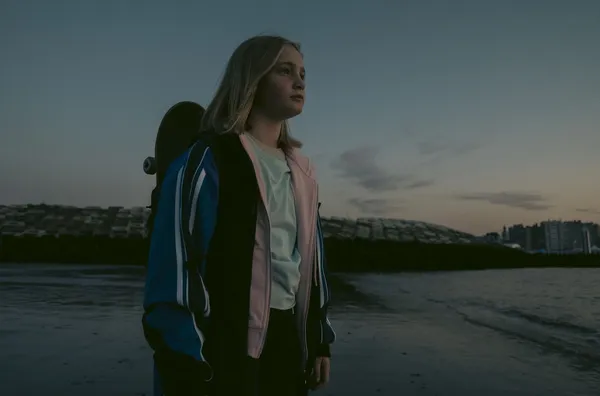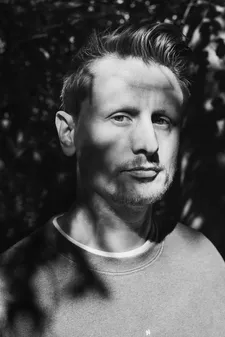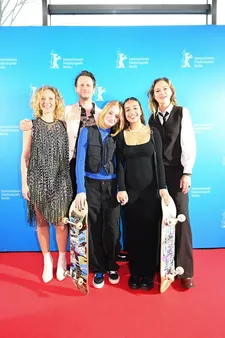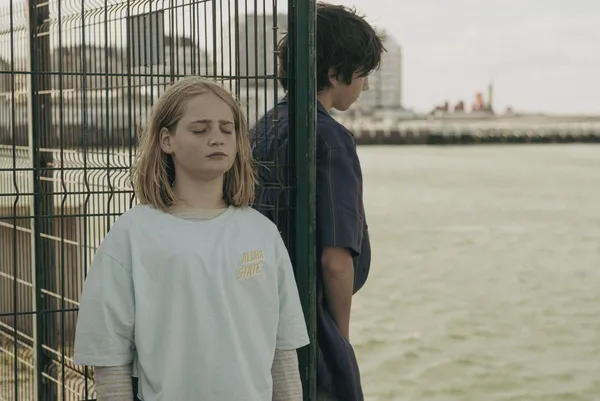 |
| Saar Rogiers as Lena in Sea Sparkle. Domien Huyghe: 'She really understood what her character was going through and you see it' Photo: Aaron La Peirre |
Sea Sparkle is a Belgian family film that sees the world of teenager Lena (Saar Rogiers) rocked by the death of her fisherman father and his crew while they are out at sea. While trying to come to terms with the loss, she becomes convinced that there is a monster in the water near her town and is increasingly determined to convince everyone else. The film, directed by Domien Huyghe and co-written with Jean-Claude Van Rijckeghem and Hyghe’s sister Wendy embeds the story of grief within an adventure as Lena enlists the help of new friend Vincent (Sverre Rous) to try to find out the truth. We caught up with siblings Domien and Wendy Huyghe after Sea Sparkle’s premiere at Berlin Film Festival to talk about making the drama, which draws on their own experience of the grief of losing their father when they were young.
Amber Wilkinson: Obviously, this is a personal project for you. Did that affect the way that you approached it, since it’s rooted in your own life?
Wendy Huyghe: I think the process went a bit in waves. At some point, we were too personal, and then got to too much of a distance. I think, during writing, it was about finding the balance. What is very personal is the feelings of the character – the fact that she feels alone, she feels like in the world around her everybody's having fun, and she's very lonely. I think that's really based on real emotions that we experienced. The plot, the adventure is, of course, fiction. That was really important for us to tell an adventure, so that people can enjoy an amazing adventure for 90 minutes, and then they will leave the theatre and perhaps then they can have a conversation about grief. It was about finding the balance between both.
AW: Did it help that you were writing together, that you could help one another through those sorts of things?
Domien Huyghe: Yes, I think I learned a lot about Wendy by doing this film, about the way she approached grieving and her emotions back when we were young. Of course, it helped that we really knew what we wanted to do with this film. So we had each other's back during the whole film, not only during development, but also during shooting, I could talk to Wendy about certain things. I think that it was very fruitful to have this brother/sister collaboration now turning into a film.
 |
| Director Domien Huyghe: 'I learned a lot about Wendy by doing this film, about the way she approached grieving and her emotions back when we were young' |
AW: That's interesting that you say that you found out things that you didn't realise about your own experiences of grief. Were you surprised by that all these years later?
WH: Actually, I was. A funny thing is that, I think the film was already completely finished and then at a certain point I see our main character, really screaming. It was then that I realised, “Okay, I just created a character that I would have wanted to be back then”. Because I didn't scream. I was too gentle in a way because I also was the oldest in the family and I was almost too nice in my grief. I saw this angry character and it was then that I realised, all these years later, Lena is like the person that I would have wanted to be back then.
AW: How hard was it to cast Lena, because Saar Rogiers is terrific in the role.
DH: Everybody warned me, the most important thing will be finding your main character. She's in every scene, she has to be the happiest kid but in the end she has to be angry and fighting. So that was very challenging, but we were very lucky in a way that she came. It was the first day of a couple of casting days and we had 100 amazing actresses we already picked out. And at nine in the morning she came in and she just nailed it at the first take. And at 9.15am, I texted my sister, “We’ve got her.” She thought it was a joke. But Saar took the feedback, she came back and she was even better. We were so lucky. She's so mature. She knew what the story's about. It wasn't about monsters but it was about a feeling and she has to find a way to deal with that. She really understood what her character was going through and you see it. She gave so much back to us by just giving her own take at it. She really surprised us at various moments and a couple of scenes are improvised because she was just doing something with emotions and we thought, “Okay, let’s just stay here and take this shot and let's work with that” . And it's all because of her.
WH: I think you also gave her a lot of freedom.
DH: Yes, it was important. We never used a shotlist. We just went with her to the sets and she would just go on scene. She rehearsed and then we would take the camera and follow her so that she never had to worry about technical stuff like, “Stand there for the light”. No, the lights will be there because you like it and that’s fine by us. It gave her the freedom to just work with the character in the scene and all the rest we took care of.
AW: That must have been quite difficult, especially when you were shooting scenes on and in the water as you can’t light the whole ocean. Plus, I’m assuming there are quite a lot of constraints in terms of safety for children in boats. How was handling all of that?
DH: Well, we were thinking about whether we should shoot it at sea or in a water studio. We chose the latter just because it's more safe. We put the those two days at the back of the schedule and during shooting, sometimes we've talked about how, within one week, we're going to this water studio, it's going to be very big, because all the all the other things we shot are very close, very intimate. But we told them now 20 safety divers cranes will come in. So just be prepared for that. We visited the studio before so they had diving lessons, they met all the divers. They were very comfortable. And I think they really knew the character. It was very lucky that they were three kids together in this moment, because they helped each other. I was in the back with my microphone but I saw that they were helping each other and that was amazing.
AW: The way you shoot under the water is also interesting, it’s very murky, which is quite unusual as often it’s depicted as crystal clear on film.
DH: It started with the script - the story has to be real. We took that also in the ways of shooting. If you go into water, it's dark, and the grittiness in the water - it's dirty. So we used that. It gives, I think, a more realistic view of what's down there. It was important that we didn’t have crystal clear studio water that everybody will know.
When it came to the underwater stunts, Saar did everything by herself. She she said to me, ‘It was so dark there, I was a bit scared as well.’ I felt she used that. We made the scene a bit grittier than others and it helped her to go to that emotion.
AW: And how was it to shoot the scenes when Lena is racing a boat? I assume that was also challenging because it was on water and the boats were going fast.
DH: The thing is when you stand on the beach, and you look at the waves, you think, “Oh, this is a very calm sea”. Our cameraman Anton Mertens had a lot of experience and he said: “Wait till you're out there.” There's small boats with camera operators, and I was looking at my small screen very close. Man, you just, you cannot control it. And there is no single way you can control the sea. And it took us a one day to shoot this half-minute thing.”
 |
| Wendy Huyghe, Domien Huyghe, Rogiers, Dunia Elwaleed and Hilde De Baerdemaeker at the Sea Sparkle premiere Photo: Courtesy of Berlinale |
AW: There’s also a brother and sister relationship, although its flipped from your own lives because you’re the older one, Wendy, right?
WH: I don't know why we flipped the order but it was not bad to have a certain distance. There's another brother in between us, so I think it would have been a bit too personal.
AW: How does the other brother feel about you making the film?
DH: The interesting and the most beautiful thing for me, is, with our mother and our brother, we are much closer now, when it comes to talking about grieving because of this film. I'm a filmmaker, because of that terrible event that happened when I was 15 and it's my life's work now. So for our mother that was very difficult - like, “Wow, he spends his career on looking for ways to talk about this subject”. But we saw the film together in our living room, just us two, our brother, our mother. And it was such a beautiful moment. It was some kind of celebration of how we are going through this now as a family. And that is the message we would like to get out of there. And it happened to us.
AW: Are you planning to work together in future?
WH: We're working on that on the series together and on a second feature film, because I think working together feels very natural. Sometimes we don't don't need words to understand each other and it’s like an ego thing - we’re on the same page.
DH: It’s told through the eyes of a 16-year-old girl. I think we really like stories about people growing up. I think the learning curves from these characters are so amazing to explore. So that has been the same. But, you know, it's difficult to say it's for that age. I think we just need to make the film and see what happens.






















